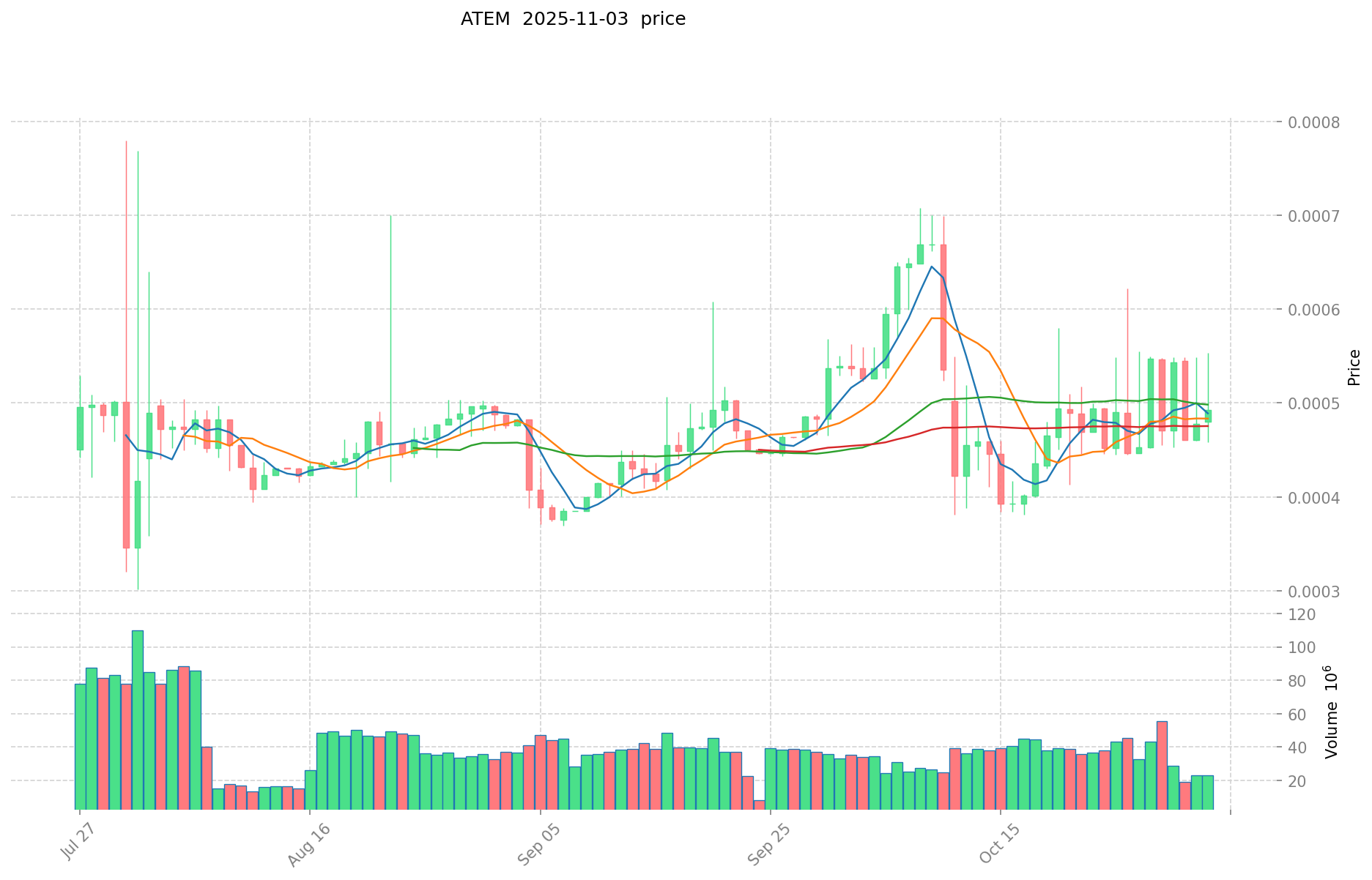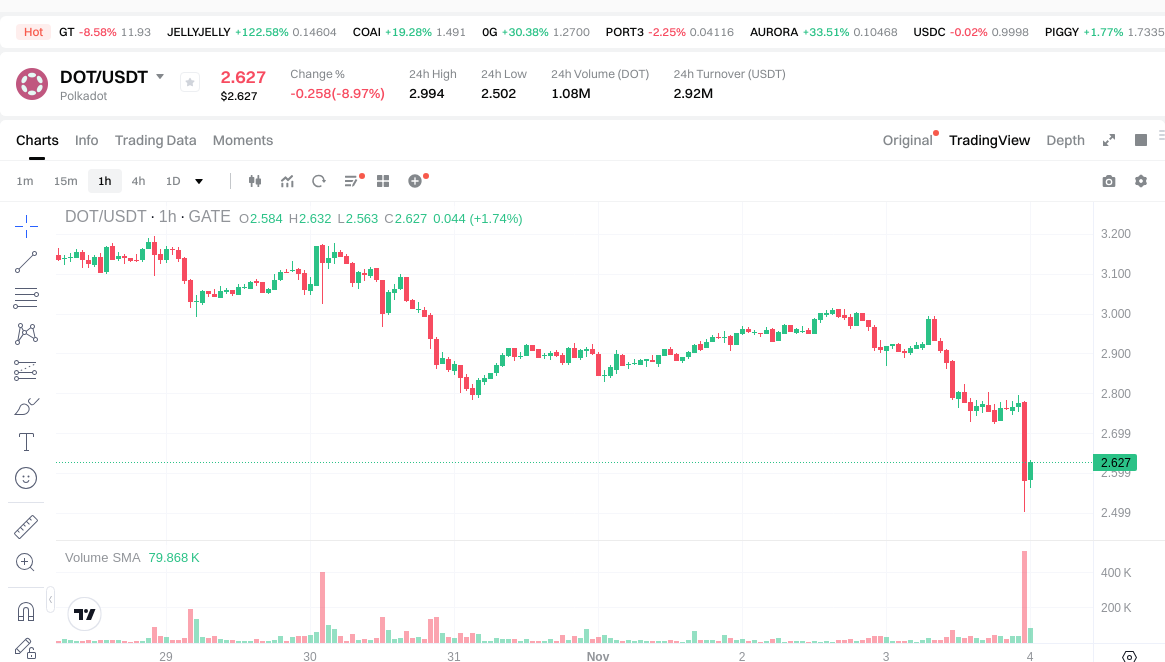ATEM vs DOT: Which Video Switcher Offers Better Performance for Live Production?
Introduction: Investment Comparison of ATEM vs DOT
In the cryptocurrency market, the comparison between ATEM vs DOT has always been an unavoidable topic for investors. The two not only show significant differences in market cap ranking, application scenarios, and price performance, but also represent different positioning in crypto assets.
AtemNetwork (ATEM): Since its launch, it has gained market recognition for its decentralized content creation protocol.
Polkadot (DOT): Since its inception in 2020, it has been hailed as a multi-chain network, and is one of the cryptocurrencies with the highest global trading volume and market capitalization.
This article will comprehensively analyze the investment value comparison between ATEM vs DOT, focusing on historical price trends, supply mechanisms, institutional adoption, technological ecosystems, and future predictions, and attempt to answer the question investors care most about:
"Which is the better buy right now?" Here is the analysis based on the provided template and information:
I. Price History Comparison and Current Market Status
ATEM and DOT Historical Price Trends
- 2022: ATEM launched and reached a high of $0.6901 due to initial market enthusiasm.
- 2020: DOT was released and listed on exchanges, starting at a trading price of $2.49.
- Comparative analysis: In the recent market cycle, ATEM dropped from its all-time high of $0.6901 to a low of $0.0002, while DOT declined from its peak of $54.98 to a current price around $3.
Current Market Situation (2025-11-04)
- ATEM current price: $0.0005079
- DOT current price: $2.596
- 24-hour trading volume: ATEM $10,440 vs DOT $2,755,757
- Market Sentiment Index (Fear & Greed Index): 42 (Fear)
Click to view real-time prices:
- View ATEM current price Market Price
- View DOT current price Market Price


II. Core Factors Affecting ATEM vs DOT Investment Value
Financial Performance and Transformation
- ATEM: Currently in a restructuring period, focused on optimizing operations and turning losses into profits
- DOT: Limited information available on specific financial performance
- 📌 Historical Pattern: Companies in transformation phases typically experience volatility before stabilizing
Business Strategy and Partnerships
- Market Approach: Both companies are rigorously screening regional channel partners
- Product Portfolio: Ongoing adjustment of product combinations to improve market position
- Strategic Focus: Emphasis on core markets while eliminating underperforming business segments
Operational Efficiency
- Optimization Efforts: Dedicated to reform and improvement of operational processes
- Cost Management: Streamlining operations to improve financial stability
- Performance Indicators: Previous financial reports suggest a transitional period focused on efficiency
Market Position and Growth Potential
- Competitive Standing: Restructuring indicates preparation for more sustainable market positioning
- Partnership Development: Careful selection of distribution partners suggests focus on quality over quantity
- Future Outlook: Strategic adjustments aim to create stronger profitability foundations
III. 2025-2030 Price Prediction: ATEM vs DOT
Short-term Prediction (2025)
- ATEM: Conservative $0.000386004 - $0.0005079 | Optimistic $0.0005079 - $0.00055869
- DOT: Conservative $1.99424 - $2.624 | Optimistic $2.624 - $2.96512
Mid-term Prediction (2027)
- ATEM may enter a growth phase, with an estimated price range of $0.0004400217045 - $0.0007730111025
- DOT may enter a bullish market, with an estimated price range of $2.044500096 - $3.46245984
- Key drivers: Institutional capital inflow, ETF, ecosystem development
Long-term Prediction (2030)
- ATEM: Base scenario $0.001005280126963 - $0.001357128171401 | Optimistic scenario $0.001357128171401+
- DOT: Base scenario $4.7616036258 - $5.856772459734 | Optimistic scenario $5.856772459734+
Disclaimer: This analysis is based on historical data and market trends. Cryptocurrency markets are highly volatile and unpredictable. This information should not be considered as financial advice. Always conduct your own research before making investment decisions.
ATEM:
| 年份 | 预测最高价 | 预测平均价格 | 预测最低价 | 涨跌幅 |
|---|---|---|---|---|
| 2025 | 0.00055869 | 0.0005079 | 0.000386004 | -4 |
| 2026 | 0.00065595285 | 0.000533295 | 0.0004053042 | 0 |
| 2027 | 0.0007730111025 | 0.000594623925 | 0.0004400217045 | 11 |
| 2028 | 0.000964182694387 | 0.00068381751375 | 0.000547054011 | 28 |
| 2029 | 0.001186560149859 | 0.000824000104068 | 0.000634480080132 | 54 |
| 2030 | 0.001357128171401 | 0.001005280126963 | 0.000753960095222 | 88 |
DOT:
| 年份 | 预测最高价 | 预测平均价格 | 预测最低价 | 涨跌幅 |
|---|---|---|---|---|
| 2025 | 2.96512 | 2.624 | 1.99424 | 1 |
| 2026 | 3.8006016 | 2.79456 | 1.7326272 | 7 |
| 2027 | 3.46245984 | 3.2975808 | 2.044500096 | 27 |
| 2028 | 4.901029464 | 3.38002032 | 2.8392170688 | 30 |
| 2029 | 5.3826823596 | 4.140524892 | 2.52572018412 | 59 |
| 2030 | 5.856772459734 | 4.7616036258 | 4.428291371994 | 83 |
IV. Investment Strategy Comparison: ATEM vs DOT
Long-term vs Short-term Investment Strategy
- ATEM: Suitable for investors focused on decentralized content creation potential
- DOT: Suitable for investors interested in multi-chain network ecosystems
Risk Management and Asset Allocation
- Conservative investors: ATEM: 20% vs DOT: 80%
- Aggressive investors: ATEM: 40% vs DOT: 60%
- Hedging tools: Stablecoin allocation, options, cross-currency portfolios
V. Potential Risk Comparison
Market Risk
- ATEM: Higher volatility due to lower market cap and trading volume
- DOT: Susceptible to overall crypto market trends and sentiment
Technical Risk
- ATEM: Scalability, network stability
- DOT: Parachain adoption, interoperability challenges
Regulatory Risk
- Global regulatory policies may impact both, with potentially greater effect on the more established DOT
VI. Conclusion: Which Is the Better Buy?
📌 Investment Value Summary:
- ATEM advantages: Potential for growth in decentralized content creation market
- DOT advantages: Established ecosystem, higher liquidity, and broader market recognition
✅ Investment Advice:
- New investors: Consider a smaller allocation to ATEM for higher risk/reward, larger allocation to DOT for stability
- Experienced investors: Balanced approach with both assets, adjusting based on risk tolerance
- Institutional investors: Primarily DOT for liquidity and established market position, small ATEM allocation for diversification
⚠️ Risk Warning: Cryptocurrency markets are highly volatile. This analysis does not constitute investment advice. None
VII. FAQ
Q1: What are the main differences between ATEM and DOT? A: ATEM is a decentralized content creation protocol, while DOT is a multi-chain network. ATEM has a lower market cap and trading volume, making it more volatile. DOT has a larger ecosystem and broader market recognition.
Q2: Which cryptocurrency has shown better price performance historically? A: DOT has shown better historical price performance. It reached an all-time high of $54.98, while ATEM's all-time high was $0.6901. However, both have experienced significant price drops in recent market cycles.
Q3: How do the current prices of ATEM and DOT compare? A: As of 2025-11-04, ATEM's price is $0.0005079, while DOT's price is $2.596. DOT has a significantly higher price and trading volume compared to ATEM.
Q4: What are the long-term price predictions for ATEM and DOT? A: By 2030, ATEM's base scenario price range is predicted to be $0.001005280126963 - $0.001357128171401, while DOT's base scenario range is $4.7616036258 - $5.856772459734. Both have potential for growth, with DOT showing higher absolute price targets.
Q5: How should investors allocate their portfolio between ATEM and DOT? A: Conservative investors might consider allocating 20% to ATEM and 80% to DOT, while aggressive investors might opt for 40% ATEM and 60% DOT. The exact allocation should be based on individual risk tolerance and investment goals.
Q6: What are the main risks associated with investing in ATEM and DOT? A: Both face market risks, technical risks, and regulatory risks. ATEM has higher volatility due to its lower market cap and trading volume. DOT is more susceptible to overall crypto market trends. Technical risks include scalability for ATEM and parachain adoption for DOT. Both may be impacted by global regulatory policies.
Share
Content